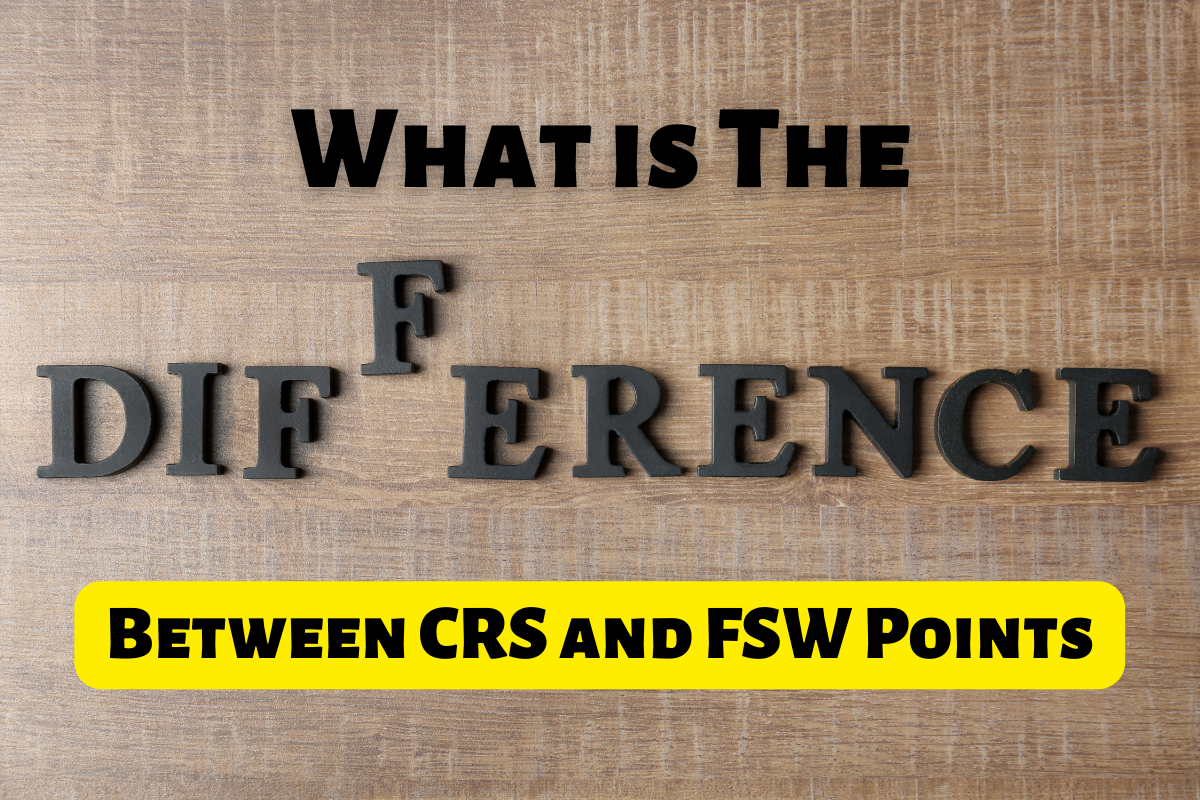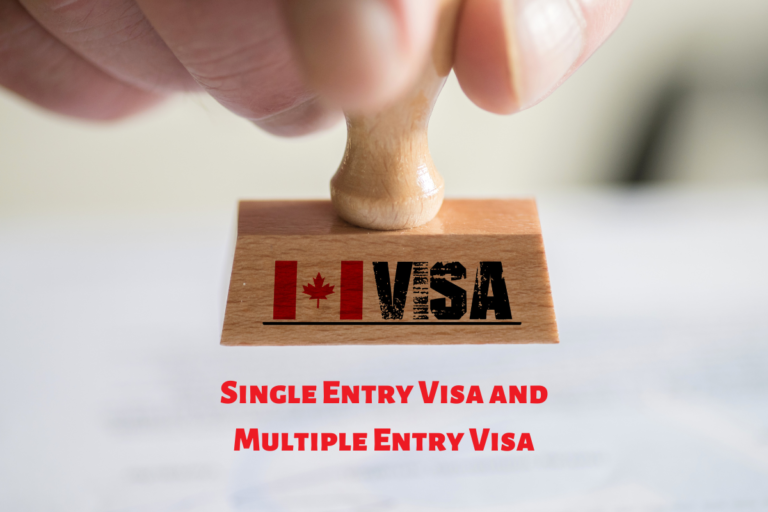What is The Difference Between CRS and FSW Points
What is the CRS Points System?
The CRS (Comprehensive Ranking System) points system is used by the Canadian government to evaluate and rank the profiles of candidates who apply for immigration to Canada through the Express Entry program.
The CRS points system awards points based on various factors such as age, education, language proficiency, work experience, and adaptability, among others. The more points a candidate earns, the higher their ranking in the Express Entry pool, and the better their chances of being invited to apply for permanent residency in Canada.
The CRS points system is designed to ensure that candidates with the highest potential to succeed and integrate into Canadian society are selected for immigration. It is a transparent and objective system that allows candidates to understand their chances of being selected for immigration and to improve their profiles by boosting their scores in various categories.
What is the Canada FSW Point System (67 points system)?
The Canada FSW (Federal Skilled Worker) point system, also known as the 67 points system, is a point-based system used to evaluate the eligibility of candidates for the Federal Skilled Worker program, one of the programs under the Express Entry system.
The FSW point system evaluates candidates based on six selection factors, including language proficiency, education, work experience, age, arranged employment, and adaptability. Candidates are awarded points based on their qualifications and characteristics, and a minimum score of 67 out of 100 points is required to be eligible for the Federal Skilled Worker program.
Here are the six selection factors and the maximum points that can be awarded for each:
- Language proficiency (28 points maximum)
- First official language: up to 24 points
- Second official language: up to 4 points
- Education (25 points maximum)
- Ph.D.: 25 points
- Master’s degree or equivalent: 23 points
- Two or more degrees (at least one of which is a three-year or longer program): 22 points
- Three-year or longer program at a university, college, trade or technical school, or other institutes: 21 points
- The two-year program at a university, college, trade or technical school, or other institutes: 19 points
- One-year program at a university, college, trade or technical school, or other institutes: 15 points
- Work experience (15 points maximum)
- At least 6 years: 15 points
- At least 4 years but less than 6 years: 13 points
- At least 2 years but less than 4 years: 11 points
- At least 1 year but less than 2 years: 9 points
- Age (12 points maximum)
- 18 to 35 years old: 12 points
- Each year older subtracts 1 point, with 0 points awarded at age 47 and above.
- Arranged employment in Canada (10 points maximum)
- Full-time employment for a Canadian employer, with a valid job offer and a positive LMIA (Labour Market Impact Assessment): 10 points
- Adaptability (10 points maximum)
- Spouse or partner’s language proficiency: up to 5 points
- A previous study in Canada: up to 5 points
- Previous work in Canada: up to 10 points
- Relatives in Canada (18 years or older): up to 5 points
The FSW point system is designed to assess a candidate’s potential to succeed and contribute to the Canadian economy based on their skills, qualifications, and other characteristics.
Differences Between FSW points and CRS points
The Federal Skilled Worker (FSW) points system and the Comprehensive Ranking System (CRS) are both point-based systems used by the Canadian government to evaluate and rank the profiles of candidates for immigration to Canada. However, there are several key differences between the two systems:
- Purpose: The FSW points system is used to assess the eligibility of candidates for the Federal Skilled Worker program, while the CRS is used to rank the profiles of candidates in the Express Entry pool for all programs under the Express Entry system, including the Federal Skilled Worker program, the Federal Skilled Trades program, and the Canadian Experience Class.
- Selection Factors: The FSW points system evaluates candidates based on six selection factors, including language proficiency, education, work experience, age, arranged employment, and adaptability. The CRS, on the other hand, evaluates candidates based on several factors, including age, language proficiency, education, work experience, and additional factors such as Canadian education or work experience, provincial nomination, or a valid job offer.
- Point Allocation: The FSW points system awards a maximum of 100 points, while the CRS awards a maximum of 1,200 points. The FSW points system has a minimum score requirement of 67 points, while there is no minimum score requirement for the CRS.
- Eligibility: Candidates who meet the minimum score requirement of 67 points under the FSW points system may be eligible to apply for the Federal Skilled Worker program, while candidates with higher CRS scores are more likely to receive an Invitation to Apply (ITA) for permanent residency in Canada.
- Flexibility: The FSW points system is more rigid, as candidates must score a minimum of 67 points and meet all other eligibility criteria to be considered for the Federal Skilled Worker program. The CRS, on the other hand, is more flexible, as candidates can improve their scores by boosting their scores in various categories, such as language proficiency or education, and may also be eligible for provincial nominations or a valid job offer, which can significantly increase their CRS scores.
Overall, while both the FSW points system and the CRS are point-based systems used by the Canadian government to evaluate and rank candidates for immigration to Canada, they differ in their purpose, selection factors, point allocation, eligibility criteria, and flexibility.
Calculate Your CRS Score
I can explain the process of calculating the CRS score and the selection factors that are taken into consideration.
The CRS score is based on several factors, including:
- Core human capital factors: age, education, language proficiency in English or French, and work experience.
- Spouse or common-law partner factors: education, language proficiency in English or French, and work experience.
- Skill transferability factors: a combination of a candidate’s education, language proficiency, and work experience that may lead to better economic outcomes in Canada.
- Additional factors: such as Canadian education or work experience, a valid job offer from a Canadian employer, or a nomination from a Canadian province or territory.
The maximum CRS score is 1,200, but the minimum score required to be eligible for an Invitation to Apply (ITA) for permanent residency in Canada varies depending on the specific Express Entry draw.
To calculate your CRS score, you will need to determine your scores in each of the four categories mentioned above. You can use the CRS score calculator tool on the Immigration, Refugees, and Citizenship Canada (IRCC) website to estimate your CRS score based on the information you provide.
Alternatively, you can consult with a licensed immigration consultant or lawyer who can provide you with an accurate assessment of your eligibility and CRS score based on your specific circumstances.
How to Increase your CRS Score?
There are several ways to increase your Comprehensive Ranking System (CRS) score and improve your chances of receiving an Invitation to Apply (ITA) for permanent residency in Canada:
- Improve your language skills: Language proficiency in English or French is a crucial factor in the CRS system, and increasing your language scores can significantly boost your CRS score. You can take language classes or language proficiency tests to improve your scores.
- Obtain Canadian education or work experience: Additional points are awarded for Canadian education or work experience, as it shows your ability to integrate into the Canadian labor market. You can consider pursuing further education in Canada or obtaining a job offer from a Canadian employer.
- Gain more work experience: You can gain more work experience in your field of expertise, which can also boost your CRS score. Candidates with more than three years of work experience in a skilled occupation can receive additional points.
- Obtain a provincial nomination: Many Canadian provinces and territories have their own immigration programs that offer nominations for permanent residency. A provincial nomination can add up to 600 points to your CRS score.
- Improve your spouse or common-law partner’s profile: If you are married or in a common-law relationship, improving your spouse or partner’s language proficiency, education, or work experience can also increase your CRS score.
- Re-take the language proficiency test: If you have taken a language proficiency test before and did not achieve your desired scores, you can consider re-taking the test to improve your scores.
- Reassess your education: If you have not completed a post-secondary education program or if your education credentials are not recognized in Canada, you can consider reassessing your education or pursuing further education in Canada to improve your CRS score.
Overall, increasing your CRS score requires a comprehensive evaluation of your individual circumstances and determining the best strategies to improve your profile. You can consult with a licensed immigration consultant or lawyer to assess your eligibility and provide guidance on how to increase your CRS score.
CRS Points Table
The Comprehensive Ranking System (CRS) points table is used by the Canadian government to assess the eligibility of candidates for the Express Entry program. The following table shows the CRS point breakdown for each factor:
Factor: Core human capital factors
Maximum Points: 500
- Age | 110
- Education | 150
- Language proficiency | 160
- Work experience | 80 Spouse or common-law partner factors | 40
- Education | 10
- Language proficiency | 20
- Work experience | 10 Skill transferability factors | 100
- Education and language proficiency | 50
- Foreign work experience and language proficiency | 50 Additional factors | 600
- Canadian education | 30
- Canadian work experience | 50
- A valid job offer | 200
- Provincial nomination | 600 Total | 1,200
Note that these points are subject to change, and the CRS point requirements for receiving an Invitation to Apply (ITA) may vary depending on the specific Express Entry draw. It is essential to regularly check the Immigration, Refugees and Citizenship Canada (IRCC) website for the most up-to-date information.
Spousal and Non-Spousal points
The Comprehensive Ranking System (CRS) awards points for both spousal and non-spousal factors to determine the eligibility of candidates for the Express Entry program.
Spousal factors refer to the education, language proficiency, and work experience of the candidate’s spouse or common-law partner. Non-spousal factors refer to the education, language proficiency, and work experience of the candidate.
The maximum number of points that can be awarded for spousal factors is 40, while the maximum for non-spousal factors is 500.
The following is a breakdown of the points awarded for each factor:
Spousal factors:
- Education: Up to 10 points can be awarded if the candidate’s spouse or partner has completed a post-secondary education program in Canada or abroad.
- Language proficiency: Up to 20 points can be awarded for the candidate’s spouse or partner’s language proficiency in English or French.
- Work experience: Up to 10 points can be awarded for the candidate’s spouse or partner’s work experience.
Non-spousal factors:
- Age: Up to 110 points can be awarded based on the candidate’s age at the time of application.
- Education: Up to 150 points can be awarded based on the level of education completed by the candidate.
- Language proficiency: Up to 160 points can be awarded for language proficiency in English or French, based on results from a designated language proficiency test.
- Work experience: Up to 80 points can be awarded based on the candidate’s work experience.
- Skill transferability factors: Up to 100 points can be awarded based on a combination of the candidate’s education, language proficiency, and work experience.
- Additional factors: Up to 600 points can be awarded for Canadian education, Canadian work experience, a valid job offer, or a provincial nomination.
Note that these points are subject to change, and the CRS point requirements for receiving an Invitation to Apply (ITA) may vary depending on the specific Express Entry draw. It is essential to regularly check the Immigration, Refugees and Citizenship Canada (IRCC) website for the most up-to-date information.




